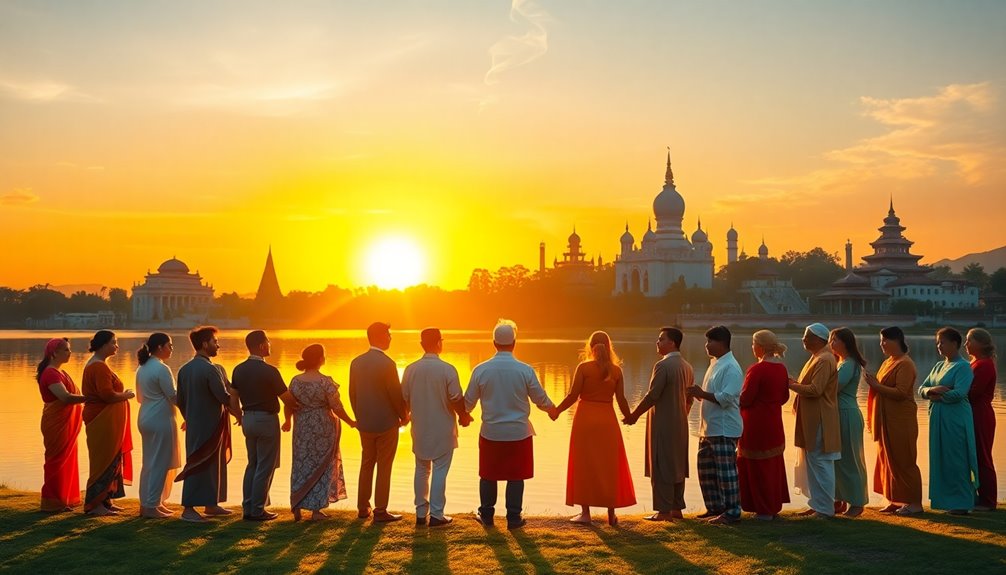Spirituality and culture are closely linked, shaping your worldview and influencing how you see existence and morality. Your beliefs can guide community connections and create a sense of belonging through shared values. Traditional beliefs offer frameworks for ethical behavior, while modern and postmodern perspectives allow for more personalized expressions of spirituality. This flexibility fosters compassion and understanding amid diverse viewpoints. As you explore these layers of spirituality and culture, you'll uncover how engaging with different beliefs enriches personal growth and strengthens community ties. There's much more to discover about this dynamic interplay and its impact on your life.
Key Takeaways
- Spirituality connects individuals to higher meanings, influencing personal beliefs and shaping cultural practices and community identities.
- Cultural expressions, such as rituals and traditions, reflect underlying spiritual beliefs, reinforcing moral values and ethical guidelines.
- Diverse worldviews foster compassion and inclusivity, enhancing communication and understanding among different belief systems in society.
- Modern and postmodern spirituality encourage individual exploration of beliefs, impacting social attitudes and fostering community engagement through shared values.
- Youth play a crucial role in promoting inclusivity by recognizing shared values, enhancing interfaith dialogue, and addressing social challenges collaboratively.
Defining Spirituality and Culture

When we think about spirituality and culture, we often find they're deeply intertwined, shaping how we see the world and ourselves. Spirituality involves personal beliefs and practices that connect you to a higher meaning or purpose. It influences your values and behaviors within a cultural context.
On the other hand, culture is heavily shaped by religious beliefs, manifesting in rituals, traditions, art, and social interactions that unify communities and establish shared identities.
As you explore contemporary spirituality, you'll notice a movement away from organized religion, promoting individual experiences that contribute to cultural diversity and personal expression. This shift allows you to engage with spirituality in ways that resonate with your identity and community, fostering a sense of belonging.
Mindfulness practices, for instance, have gained popularity in Western societies, reflecting this blend of spirituality and culture while impacting social attitudes toward well-being and environmental consciousness. Additionally, understanding the dynamics of narcissistic tendencies can help you navigate complex relationships within spiritual and cultural contexts.
Understanding the relationship between spirituality and culture is essential for fostering interfaith dialogue and promoting social cohesion. By recognizing how these elements shape your worldview, you can better appreciate the diverse beliefs and practices that enrich your community.
The Role of Worldviews

Understanding spirituality and culture naturally leads to the exploration of worldviews, which serve as the lens through which you interpret existence and morality. Your worldview shapes how you perceive right and wrong, influencing your choices and actions in daily life.
The four main worldviews—Traditional, Modern, Postmodern, and Integrative—each present unique perspectives on truth and knowledge, impacting both personal beliefs and societal values.
Recognizing the diversity of worldviews enhances your understanding of others, fostering compassion and clearer communication. This awareness is crucial, especially when addressing issues related to social justice.
By integrating various worldviews, you can develop a more holistic understanding of reality, striking a balance between tradition and contemporary reasoning.
Worldviews don't just influence individual beliefs; they also shape cultural practices and ethical guidelines, molding the social structures around you.
As you engage with different perspectives, you contribute to a more inclusive society that values dialogue and understanding. By embracing this diversity, you can help create a community that supports both spiritual growth and social justice, ultimately enriching your worldview and the world at large. Additionally, understanding the financial implications of separation can help individuals navigate complex emotions and decisions that arise during significant life changes.
Traditional Beliefs and Their Impact

Traditional beliefs play a crucial role in shaping our moral compass and guiding our actions. These beliefs often provide a framework for moral values and ethical guidelines that influence societal norms and behaviors. For instance, the Ten Commandments in Christianity or Dharma in Hinduism establish principles that shape your worldview and interactions with others.
Rituals and ceremonies rooted in traditional beliefs, like baptism or marriage customs, foster community identity and cohesion. They reinforce shared values and social bonds, making you feel connected to something larger than yourself. Festivals such as Diwali in Hinduism or Eid in Islam celebrate these beliefs while preserving cultural heritage, promoting social unity among adherents.
Moreover, traditional beliefs dictate specific cultural practices, including dress codes during religious ceremonies, which maintain cultural identity and visually express faith.
The hierarchical structures within these belief systems often establish social organization and power dynamics, influencing access to resources and authority within communities. Additionally, the teachings of various faiths, such as those found in Jesus quotes, can inspire individuals to cultivate love and compassion in their daily lives.
In essence, traditional beliefs not only shape individual behaviors but also mold the social fabric of societies, guiding how you relate to your community and the world around you.
Modern Perspectives on Spirituality
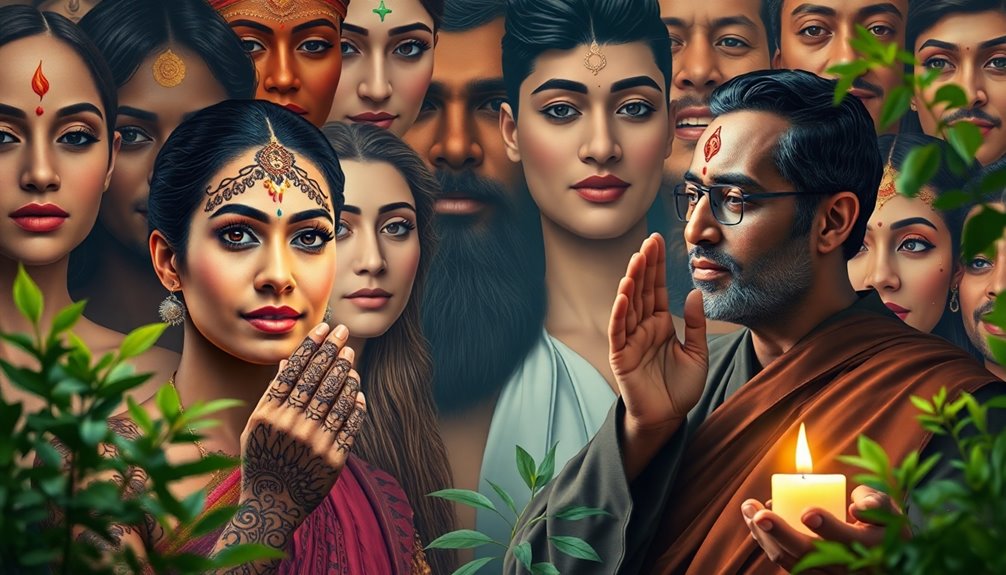
Modern spirituality has gained traction as a response to the waning influence of established religious institutions, particularly in Western societies. You'll notice that contemporary spirituality emphasizes individualistic and flexible expressions of belief. This shift has led many to embrace diverse spiritual practices, influenced by the New Age phenomenon, which blends romanticism with capitalism. From 1981 to 2000, this cultural movement significantly shaped social and political attitudes.
You might also be intrigued to learn that mindfulness practices tied to contemporary spirituality have positive effects on climate action motivation. This connection highlights how spiritual beliefs can foster sustainable behaviors, merging personal growth with environmental consciousness.
Additionally, a structural–developmental perspective reveals that your spiritual growth isn't linear; it intertwines with broader societal changes.
Moreover, the rise of interfaith initiatives showcases a growing desire among young adults for understanding and cooperation among various spiritual traditions. With 70% supporting interfaith interactions, it's clear that you're part of a generation seeking a comprehensive worldview that embraces diversity in spirituality.
This modern landscape invites you to explore and redefine your own beliefs within a richer, interconnected framework.
Postmodernism and Spirituality
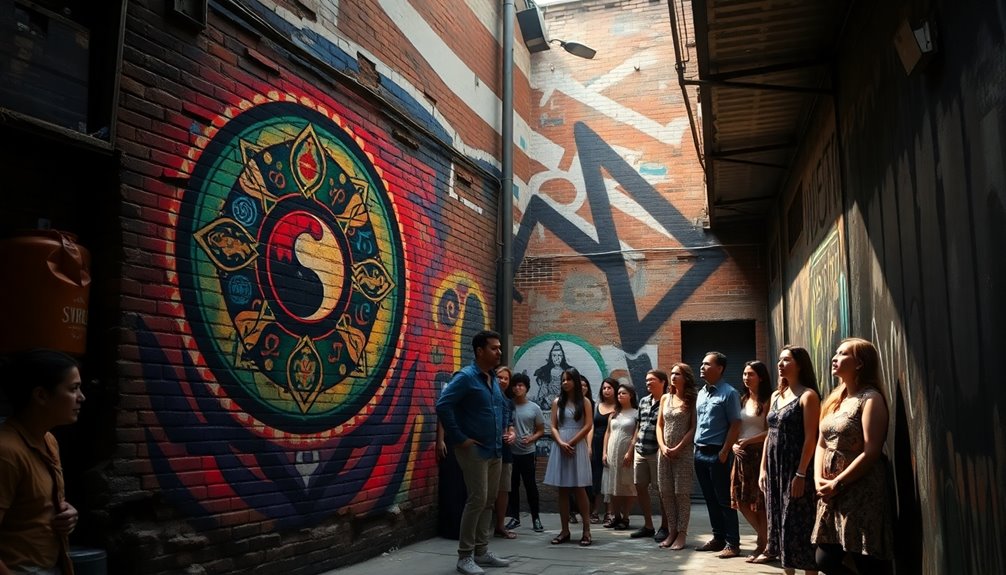
Postmodernism reshapes the landscape of spirituality by embracing pluralism and relativism, leading you to explore a diverse array of beliefs and practices. This shift encourages you to question traditional structures and absolute truths, allowing for a more individualized approach to spirituality.
With postmodernism, you can curate your own belief system, blending elements from various religious and secular traditions.
Contemporary spirituality often reflects this postmodern skepticism towards organized religion, emphasizing personal experience and subjective meaning. You might find yourself drawn to New Age movements that promote openness to different worldviews, integrating mindfulness practices that enhance ecological awareness and social cohesion.
However, the rise of postmodern spirituality brings both empowerment and challenges. While it fosters personal growth, it can also lead to commodification and superficial engagement with deeper spiritual meanings.
As you navigate this landscape, you'll need to discern what resonates with your authentic self and what might merely be a trend.
Ultimately, postmodernism invites you to embrace a more fluid understanding of spirituality, encouraging exploration and connection while remaining vigilant about the quality and depth of your spiritual journey.
Integrative Approaches to Beliefs
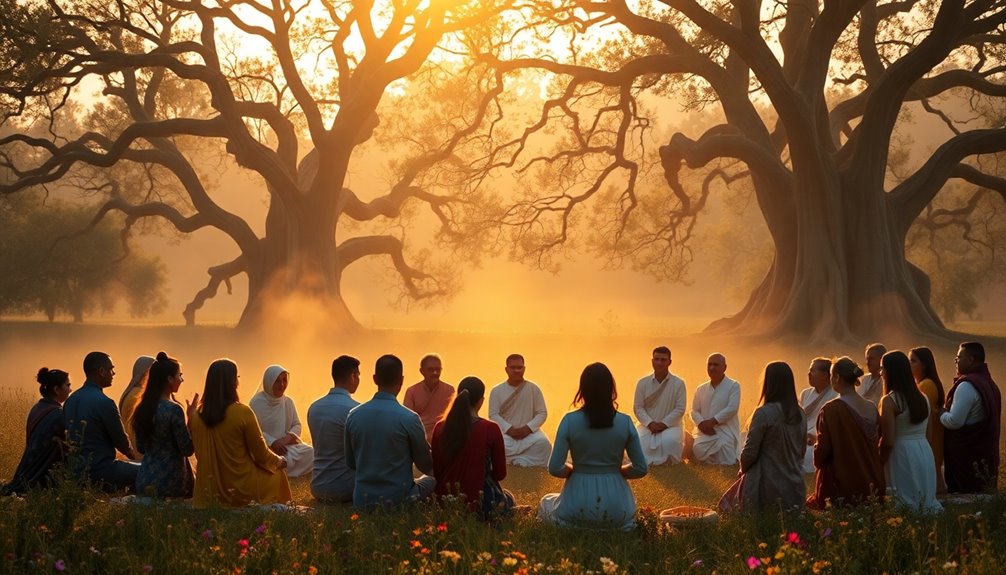
Embracing an integrative approach to beliefs allows you to weave together diverse perspectives, creating a rich tapestry of understanding that transcends rigid boundaries. This integrative worldview blends elements from tradition, reason, and diversity, promoting a holistic understanding of reality and interconnectedness.
By valuing the interplay between material and transcendent aspects of life, you can foster a balanced approach to your personal beliefs and community engagement.
In a world increasingly characterized by postmodern fragmentation, integrative approaches help you navigate complexities while maintaining coherence among diverse beliefs. This perspective emphasizes the importance of community and service, aligning with the idea that collective action is essential for addressing pressing social and ecological issues.
It encourages clarity in communication and helps you understand core values even amid diversity.
As you explore spirituality within this integrative framework, you'll find it particularly relevant to contemporary discussions. It not only promotes unity in diversity but also reflects a commitment to the interconnectedness of all life.
Community and Shared Values
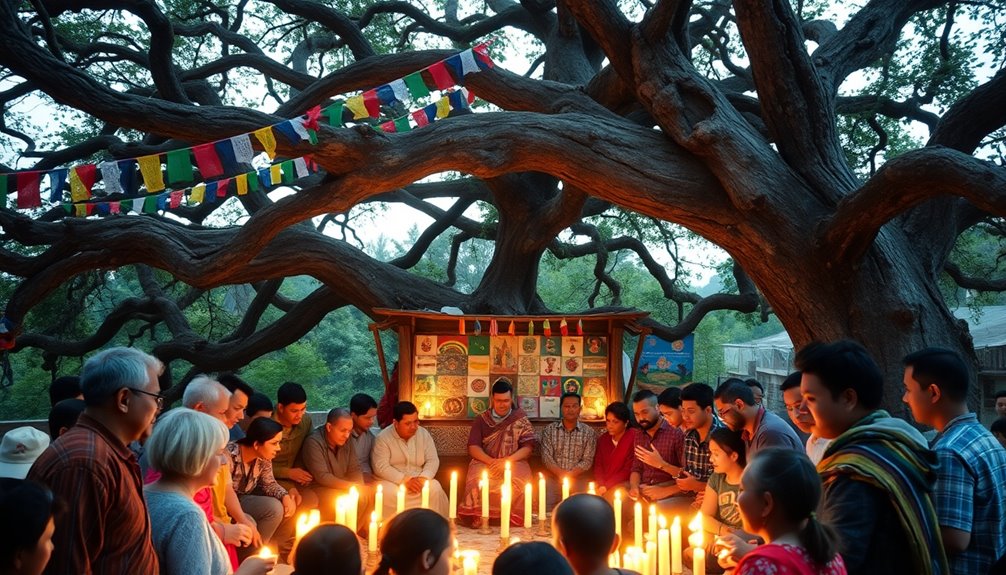
Building strong communities relies on shared values that connect individuals and foster a sense of belonging. When you engage in communal rituals and traditions, like baptism in Christianity or Diwali in Hinduism, you reinforce these values and create a collective identity.
This interconnectedness is vital; research shows that fostering relationships enhances understanding and shared purpose, crucial for navigating diverse worldviews.
Your commitment to community service, often inspired by faith, embodies these shared values. Many religious traditions emphasize serving others, which promotes collective action to tackle social and ecological issues.
This sense of responsibility not only strengthens bonds among community members but also highlights a shared mission to improve the world.
Moreover, with 70% of young adults supporting interfaith interactions, it's clear that shared values play a significant role in building inclusive communities.
By embracing diversity and focusing on common beliefs, you can create spaces where everyone feels valued and understood.
In today's complex landscape, nurturing community through shared values is essential for fostering harmony and collaboration among various belief systems. Additionally, understanding the impact of emotional dysregulation on relationships can further enhance community support initiatives.
Frequently Asked Questions
How Does Culture Shape Our Worldview?
Culture shapes your worldview by influencing your beliefs, values, and practices. It affects how you interpret experiences and interact with others, creating a framework through which you view the world.
Traditions, language, and art enrich your understanding and provide context for your experiences. As you engage with different cultural narratives, you broaden your perspective, enabling you to empathize with others and appreciate the diversity of thought that exists around you.
What Is Spirituality in Worldview?
Spirituality in your worldview represents the beliefs and practices that connect you to something greater than yourself.
It shapes how you understand existence, morality, and purpose. By integrating spirituality, you can foster a holistic perspective that embraces both the material and transcendent aspects of life.
This connection often enhances your well-being, influences your choices, and motivates you to engage with the world around you, promoting a sense of community and interconnectedness.
In What Ways Do Religious Beliefs Shape a Society's Worldview?
Religious beliefs shape your society's worldview by providing moral frameworks that guide ethical behavior and social norms. They influence family structures, community responsibilities, and justice systems.
You see this in rituals that create a sense of belonging and shared values. Additionally, religious teachings often inspire movements for social justice, encouraging collective action against inequality.
Ultimately, these beliefs affect art, music, and literature, enriching your cultural landscape and identity.
How Is Our Worldview Shaped?
Your worldview is shaped by a mix of personal experiences, cultural influences, and societal norms.
You absorb beliefs from family, friends, media, and community, which all contribute to how you interpret reality.
Your understanding of morality, relationships, and life's purpose emerges from these influences.
As you navigate life, you might adopt elements from different worldviews, allowing you to see the world through a more nuanced lens that reflects your unique perspective.
Conclusion
In understanding spirituality's role in culture, you see how deeply beliefs shape your worldview. Whether through traditional practices or modern interpretations, these influences guide your values and connections with others. Embracing both integrative approaches and community ties enriches your life, fostering a shared sense of purpose. As you navigate this complex landscape, remember that your unique perspective contributes to a broader tapestry of human experience, reminding you of the power of belief in shaping who you are.



